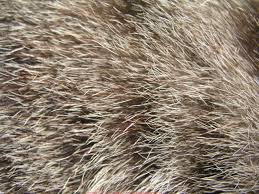fur
英 [fɜːr]
美 [fɝː]
- n. 皮,皮子;毛皮;软毛
- n. 水垢
- vt. 用毛皮覆盖;使穿毛皮服装
- n. (Fur)人名;(法)菲尔;(瑞典)富尔
使用频率:

记忆方法
将“fur”想象成“马”奔跑时扬起的毛发,或者是一个毛茸茸的动物身上的一块毛皮,这样可以帮助记忆这个词表示的是皮毛或毛皮。
以上内容由AI生成, 仅供参考和借鉴
中文词源
fur 毛皮
来自Proto-Germanic*fodram,鞘,衬里,进一步来自PIE*pa, 保护,喂养,词源同food, fodder.
英语词源
- fur
-
fur: [14] Old English did not have a distinct word for ‘animal’s hair’ – the nearest approach to it was fell ‘animal’s hide’. Then in the 13th century English acquired the verb fur ‘line with fur’ from Anglo-Norman *furrer or Old French forrer ‘encase, line’. These were derivatives of the Old French noun forre ‘sheath, case’, a loanword from prehistoric Germanic *fōthram ‘sheath’, which in turn goes back to the Indo-European base *pō- ‘protect’.
In the 14th century the new English verb was taken as the basis for a noun, which originally meant ‘trimming for a garment, made from fur’, or more loosely ‘garment made from fur’; it was not until the 15th century that it was used for ‘animal’s hair’.
- fur (n.)
- late 14c. "trimming or lining of a garment" (implied c. 1300 in surname Furhode "fur hood"), probably from Old French forrer, fourrer "cover with fur, line (clothing)," in general "to cover, fill with," from fuerre "sheath, scabbard" (via notion of "covering"), from Frankish *fodr or another Germanic source, from Proto-Germanic *fodram "sheath" (cognates: Old Frisian foder "coat lining," Old High German fotar "a lining," German Futter, Gothic fodr "sword sheath"), from PIE root *pa- "to protect, feed" (see food (n.)).
First applied c. 1400 to the hairy pelt of an animal, whether still on the animal or not. The Old French noun might have had the sense "hide, fur, pelt" (and thus might serve as the immediate source of the English noun), but this is not attested. Absent this, the sense transfer from the lining to the material that goes to make it probably happened in English. As an adjective from 1590s.I'le make the fur Flie 'bout the eares of the old Cur. [Butler, "Hudibras," 1663]
- fur (v.)
- c. 1300 (implied in furred), from fur (n.) or Old French fourrer "to line." Related: Furring.
权威例句
- 1. We were amused to see how assiduously the animal groomed its fur.
- 看着这只动物如此认真地梳理自己的毛,我们被逗乐了。
- 2. Mrs Brown wrapped the thinly clad man in her fur coat.
- 布朗夫人用自己的皮大衣把那个衣衫单薄的男子裹住。
- 3. Fifty-five foxes were released from a fur farm by animal rights activists.
- 动物权利保护主义者把55只狐狸从毛皮动物饲养场放了出来。
- 4. Wearing fur has become deeply unfashionable.
- 穿毛皮衣物已经相当过时了。
- 5. Its fur is short, dense and silky.
- 它的毛又短又密,柔软光洁。
